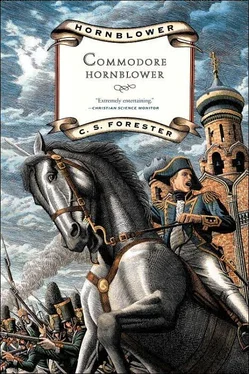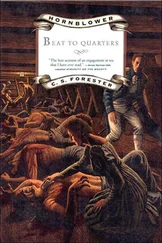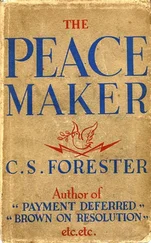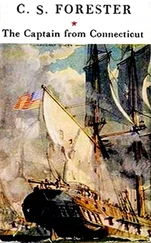The Countess at his side was stirring, too. He knew, telepathically, what she was thinking about. The literature of all ages, from the Ars Amatoria to Les Liaisons Dangereuses told him theoretically of the effect of music and spectacles upon the feminine mind, and in violent revulsion he hated the Countess as much as he hated music. The only movement he made, as he sat there stoically enduring the tortures of the damned for the sake of his duty, was to shift his foot away out of reach of hers—he knew in his bones that she would endeavour to touch him soon, while her beaky-nosed husband with his quizzing glass sat just behind them. The entr’acte was only a poor respite; the music at least ceased, and he was able to stand, blinking a little as the thrown-open door of the box admitted a stream of light, and he bowed politely when the Governor presented a few latecomers who came to pay their respects to the British visitor. But in no time at all, it seemed, he was forced to seat himself again, while the orchestra resumed its maddening scraping, and the curtain rose on a new scene.
Then a distraction came. Hornblower was not sure when he first heard it; he might have missed the first premonitory shots in his determined effort to shut himself inside himself. He came out of his nightmare conscious of a new tension in the people round him; the boom of heavy artillery was very noticeable now—it even seemed as if the theatre itself were vibrating gently to the heavy concussions. He kept his head and neck still, and stole a glance out of the corner of his eye at the Governor beside him, but the Governor seemed to be still entirely engrossed in watching Mme Nicolas. Yet the firing was very heavy. Somewhere not very far away big guns were being fired rapidly and in large numbers. His first thought was for his ships, but he knew them to be safe, anchored at the mouth of the Dwina, and if the wind was still in the direction it was blowing when he entered the theatre Bush could get them out of harm’s way whatever happened, even if Riga were taken by storm that very hour.
The audience was taking its cue from the Governor, and as he refused to allow the gunfire to distract him everyone made a brave attempt to appear unconcerned. But everyone in the box, at least, felt tightened nerves when rapid steps outside in the stone-flagged corridor, to the accompaniment of the ringing of spurs, heralded the entrance of an orderly officer, who came in and whispered hurriedly to the Governor. Essen dismissed him with a few words, and only when he had gone, and after a minute’s interval which seemed like an hour, leaned over to Hornblower with the news.
“The French have tried to take Daugavgriva by a coup de main ,” he explained. “There is no chance of their succeeding.”
That was the village on the left bank of the Dwina, in the angle between the sea and the river, the natural first objective for a besieging force that was desirous of cutting off the town from all hope of relief by sea. It was nearly an island, with the Gulf of Riga covering one flank, and the mile-wide Dwina river covering the rear, while the rest was girt by marshes and ditches and protected by breastworks thrown up by the peasant labour called in from miles round. The French would be likely to try a direct assault upon the place, because success would save them weeks of tedious siege operations, and they had no knowledge as yet of whether or not the Russians were able or willing to offer effective resistance. This was the first time Macdonald had encountered any serious opposition since he had begun his advance across Lithuania—the main Russian armies were contesting the road to Moscow in the neighbourhood of Smolensk. Hornblower had inspected the works that very morning, had observed the strength of the place and the steady appearance of the Russian grenadiers who garrisoned it, and had formed the conclusion that it was safe against anything except systematic siege. Yet he wished he could be as sublimely confident about it as the Governor was.
On the other hand, everything possible had already been done. If the village fell, it fell, and nothing more serious had happened than the loss of an outwork. If the attack were beaten off there could be no question of following up the success, not while Macdonald disposed of 60,000 men and the Russians of 15,000 at most. Of course Macdonald was bound to attempt a coup de main upon Daugavgriva. It was interesting to speculate what would be his next move should the assault fail. He might march up the river and endeavour to force a passage above the town, although that meant plunging into a roadless tangle of marsh and attempting a crossing at a place where he would find no boats. Or he might try the other plan and use the boats which had fallen into his hands at Mitau to pass a force across the mouth of the river, leaving Daugavgriva untaken while he compelled the Russians in Riga to choose between coming out and fighting the landing party, or retreating towards St. Petersburg, or being shut in completely in the town. It was hard to guess what he would decide on. Certainly Macdonald had sent out Jussey to reconnoitre the river mouth, and although he had lost his chief engineer in doing so he might still be tempted by the prospect of being able to continue immediately his advance on St. Petersburg.
Hornblower came back to himself, delighted to find that he had missed in his abstraction some substantial amount of the ballet. He did not know how long his absent-mindedness had endured, but it must be, he thought, for some considerable time. The gunfire had ceased; either the assault had failed or had been completely successful.
At that very moment the door opened to admit another orderly officer with a whispered message for the Governor.
“The attack has been beaten off,” said Essen to Hornblower. “Yakoulev reports his men have hardly suffered at all, and the front of the place is covered with French and German dead.”
That was to be expected, granted the failure of the attack. The losses would be dreadful in an unsuccessful assault. Macdonald had gambled, risking a couple of thousand lives against a speedy end to the siege, and he had lost. Yet an Imperial army would be exasperated rather than depressed by such a preliminary reverse. The defence could expect further vigorous attacks at any moment.
It was wonderful to discover that he had managed to sit through another whole ballet without noticing it. Here was another entr’acte, with the light shining into the box, and the opportunity to stand and stretch one’s legs; it was even delightful to exchange polite banalities in French tinged with half the accents of Europe. When the entr’acte ended Hornblower was quite reconciled to reseating himself and bracing himself to endure one more ballet; yet the curtain had only just risen when he felt himself heavily nudged in the thigh by Essen, who rose and made his way out of the box with Hornblower at his heels.
“We may as well go and see,” said Essen, the moment they stood outside the closed door of the box. “It would not have been well to get up and go when the firing began. But the people will not know now that we left in haste.”
Outside the theatre a troop of hussars sat their horses, while two grooms stood at the heads of two more horses, and Hornblower realized that he was committed to riding in his full-dress uniform. It was not the serious business it used to be, though; Hornblower thought with pleasure of his dozen reserve pairs of silk stockings stored away in Nonsuch. Essen climbed on to his horse, and Hornblower followed his example. The bright full moon filled the square with light, as, with the escort following, they trotted clattering over the cobbles. Two turns and a moderate descent brought them to the big floating bridge that spanned the Dwina; the roadway across the pontoons drummed hollow beneath the horses’ hoofs. Across the river a road ran on the top of a high levée beside the water; on the far side the land was cut and seamed with ditches and ponds, around which twinkled innumerable camp-fires, and here Essen halted and gave an order which sent the hussar officer and half the escort riding ahead of them.
Читать дальше












